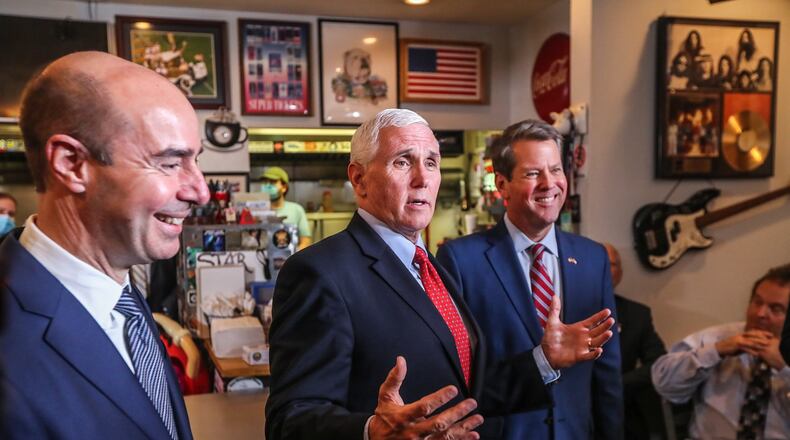Georgia’s GOP leaders are laying out the welcome mat for the Republican National Convention, stoked by President Donald Trump's threats to move the August gathering from Charlotte unless the state’s governor can guarantee full attendance.
Atlanta’s mayor, meanwhile, is firmly opposed to the idea.
Gov. Brian Kemp said Georgia would be "honored to safely host" the party's seminal event, touting the state's facilities and workforce in a Tuesday tweet. And Georgia GOP chair David Shafer said he's contacted the RNC about the possibility.
That triggered sharp concerns from Atlanta Mayor Keisha Lance Bottoms, who said in a statement that the city is following a "phased, data-driven approach to reopening" that mirrors the strategy by North Carolina.
“That plan does not contemplate hosting a large gathering event in August,” said Bottoms. “In fact, several long-standing city-supported and sponsored events have already been canceled in order to comply with CDC guidelines.”
Georgia is among several states making a push for the nominating convention, which is scheduled to take place from Aug. 24-27. Organizers plan to take over the Spectrum Center in Charlotte in mid-July to remodel the event space, and about 50,000 attendees were expected before the pandemic.
In a series of tweets on Monday, Trump warned that the RNC could ditch North Carolina for a more welcoming state because Democratic Gov. Roy Cooper has yet to “allow the Republican Party to fully occupy the space.”
Vice President Mike Pence said on Fox News that Georgia, Florida and Texas are among the states that have "made tremendous progress" in reopening their economies. Florida GOP officials on Tuesday encouraged such a move.
Logistical overhaul
Shifting the nominating convention so close to the event is highly unlikely. Planning has been underway for roughly two years, and switching host cities just months before the event is a tremendous logistical undertaking even without a pandemic complicating efforts.
Officials need to plan for giant crowds of out-of-town delegates and journalists, as well as arrangements for top party figures and groups of protesters. Venues need to be overhauled, hotels booked, and utilities prepped for a surge of demand.
Credit: 2018 Getty Images
Credit: 2018 Getty Images
It also requires a sweep of security preparations. Charlotte officials recently accepted a $50 million federal grant to cover law enforcement costs, medical service and insurance fees, and city lawmakers also approved new permitting rules to brace for an influx of requests for protests and other events.
Neither Cooper nor Charlotte Mayor Vi Lyles have said definitely whether the event will go forward in August, though Cooper’s office said this week that state health officials are reviewing plans with the RNC.
And a top North Carolina health official requested a written COVID-19 safety plan from the RNC – which The Charlotte Observer indicated was a clear signal the state is planning for an in-person convention in August.
“It's OK for political conventions to be political,” Cooper said Tuesday. “But our pandemic response can't be.”
'Not out of the woods'
While Georgia’s public push for the convention is a long-shot, the pitch for tens of thousands of visitors this summer is another facet of Kemp’s aggressive strategy to reopen the state’s economy.
Those steps included Kemp’s decision to rollback economic restrictions in late April, triggering outrage from Democrats, public health officials and Trump that he was moving too quickly to let barber shops and other businesses reopen if they followed safety guidelines.
The governor's allies said his decision has been vindicated by recent data that has showed a decline in hospitalization rates and a slowing of the rate of new coronavirus infections. And Pence visited Atlanta last week to declare Georgia's reopening an "example to the nation."
Critics of Kemp's approach have questioned a series of data errors that have led the governor to order a review of the reporting process. And they've accused him of contradicting health experts and putting economic interests ahead of public safety.
Bottoms, one of Kemp's most forceful critics, announced a five-step plan last week that allows for major gatherings in Atlanta only after a sustained drop in coronavirus cases and hospitalizations.
Those large-scale events would be allowed in phase five; the mayor’s office said Atlanta is still in the first phase.
"We are not faring as badly as I thought that we would, but we certainly are not out of the woods yet," she said on ABC on Tuesday.
“People have heard that Georgia is open for business and so this weekend we saw people out and about and not always practicing social-distancing in the way we’ve encouraged them to do.”
About the Author
The Latest
Featured




